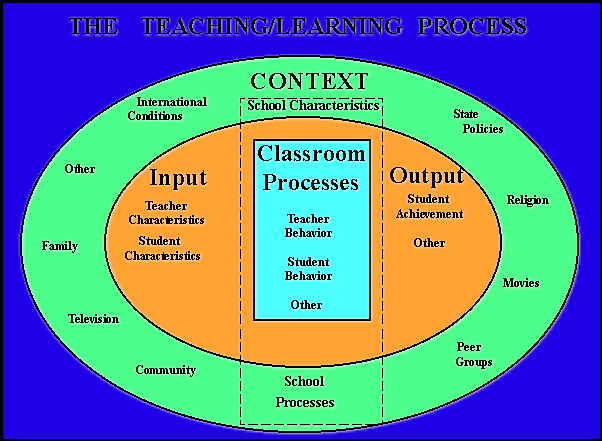
Citation: Huitt, W. (2003). A transactional framework of the teaching/learning process: A summary. Educational Psychology Interactive. Valdosta, GA: Valdosta State University. Retrieved [date] from http://www.edpsycinteractive.org/materials/mdltlp.html
Return to | Courses | Home Page |
This framework has been developed to categorize the variables that have been studied in an attempt to answer such questions as: "How do students learn?" and "Why do some students learn more than other students in classroom and school settings?"
According to the framework, the reasons can be classified into four categories.
A Transactional Framework of the Teaching/Learning ProcessContext All those factors outside of the classroom that might influence teaching and learning Input Those qualities or characteristics of teachers and students that they bring with them to the classroom experience Classroom Processes Teacher and student behaviors in the classroom as well as some other variables such as classroom climate and teacher/student relationships Output Measures of student learning taken apart from the normal instructional process.
The framework below is a sensitive image map. Click on any term in the model and you will be linked to information about that topic.

I believe the most important category is Output because once that has been defined it impacts the importance of the variables in the other categories. For example, if the desired outcome measure is a score on a standardized test of basic skills, the instructional method most likely to positively impact that measure is direct or explicit instruction (Rosenshine, 1995). However, if the desired outcome is creativity and independence, then open education may be a better alternative (Giaconia & Hedges, 1982). Alternately, if better relationships among diverse students is the goal, the cooperative learning would appear to be the better instructional method (Slavin, 1995).
This framework has been developed from the perspective of systems theory. It will be one of the main organizing features of this course. There are a variety of other frameworks and models that have been developed to organize the variables of interest in educational psychology. McIlrath and Huitt (1995) provide a review of previous models of the teaching/learning process and compare it to this proposed framework. If you prefer another framework or model, it is certainly appropriate to use it during any discussions we have about how knowledge related to educational psychology might be organized. Be sure to cite the author(s) of your model whenever you refer to it. If you have developed your own model (which I encourage you to do), you might want to have it drawn out so we can view it during our discussions.
A more complete explanation of the model with references is provided. It provides an overview and discussion of the most important variables in each category.
References:
Return to
Dr. William G. (Bill) Huitt
Dept. of Psychology, Counseling & Guidance
Valdosta State University
Valdosta, GA 31698-0001
(912) 333-5613
Copyright c 1994, 2003 -- Bill Huitt